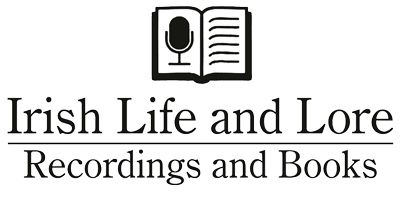This book relates to 45 recordings compiled and produced by Maurice O’Keeffe. Included with the book is an hour-long CD, giving snippets of each of the recordings. The voices on the original recordings, which can be heard on 42 individual CDs, each of approximately one hour in length, are marvellous in their variety and depth of knowledge. Topics covered include local history, national history, music and dancing, farming traditions, archaeology, religion, customs and traditions, boating and fishing on Lough Derg, island life in all its variety and isolation, pisheógs and superstitions and so much more.
Though the voices were recorded in Tipperary, there is some information of Kerry interest there too. Retired teacher John Knightly, now resident in Cashel, was born in Annascaul, where his father was station master for 20 years. John had a very famous godfather – Antarctic explorer Tom Crean, who was a great friend of his father. John recalls, on his recordings with Maurice, his boyhood adventures with Tom, who was always known as “Funny Crean” to the Knightly family. Indeed, if John’s mother would spot “Funny” Crean on his way to visit the family in the late evening, she would lock the door, as the visitor would cause “ructions” among the children, who would never be put to bed!
Knightly has a vivid childhood memory of a small plane landing at Inch beach, carrying the nephew of Scott of the Antarctic, who was coming to call on Tom Crean at Annascaul. He also recalls the story of the visit of Ernest Blythe to the Dingle peninsula to perfect his Irish, in the early years of the 20th century. Due to the poverty of the people, he had some difficulty getting a place to stay, until he wrote to An Seabhac in Dublin, and the letter was read by Tom Ashe from Kinard. Tom contacted Blythe to tell him that his brother Greg had left for America, and that his bed in the loft was available. Blythe was to stay in Kinard for about six months, perfecting his Irish, and developing a great and enduring love of the area.
John also recalls the men from the Blasket Islands coming by train from Dingle to Annascaul, to harvest the willows for the making of lobster pots. They would spend a few days cutting and binding the willows, would load them onto the train for Dingle, and onwards by namhógs back to the Blaskets.
John Knightly’s father often told his the story of the boarding of a ship from the Limerick Steamship Company, by the IRA in Ventry, in the early 1920s. The ship was carrying Guinness and flour and was brought to Dingle and unloaded by her captors. A railway engine and two carriages brought the cargo to Annascaul, and men from Miltown and Castlemaine with horses and wagons loaded up the flour and swiftly went on their way. The precious barrels of Guinness were taken by night to Moriarty’s pub in Annascaul. The operation was spotted by the parish priest of Annascaul, who announced from the pulpit the following Sunday – “the other night, a funeral passed by my house at Redcliffe, a funeral of the seventh commandment!”.
The book includes an hour-long CD, giving audio clips of each of the recordings. 159 pages.

![tipperary_book_resizrd]](https://www.irishlifeandlore.com/wp-content/uploads/2018/11/tipperary_book_resizrd.jpg)






